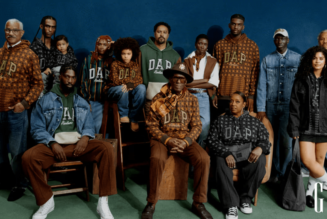
Besides, wealthy people are not a monolith. Some still shop fast fashion even when they can afford not to. Influencers such as Molly-Mae Hague have been flogging their own bargain version of quiet luxury in versatile beige and grey basics for years. A quick glance at her Instagram will render a mass of affordable blazers, tailored coats and shirts in soft, neutral tones.
Sure, Hague flashes her collection of Chanel handbags and Louis Vuitton luggage, but the Love Island star is inextricably tied to fast fashion as the creative director of Pretty Little Thing. Scrolling through the brand’s website, you’ll find quiet luxury-esque business attire, long trench coats and turtlenecks, often modelled by Hague herself. At its core, quiet luxury is another aesthetic to be consumed – at any price tag. If you’re only after the look, fast fashion can provide it.
Now, we’re not suggesting you go around checking the tags on people’s clothes to see where they got them from. Quiet luxury can easily veer into snobbery, while criticisms of fast fashion are in danger of perpetuating classism. But poorer consumers are not the ones fuelling the Shein haul industrial complex. Building a versatile capsule wardrobe, even if it comes from a fast fashion brand, is still better than buying a trendy new outfit every weekend.
There’s too much onus on the average consumer to solve the issues surrounding fast fashion, when we should be looking to wealthy owners of corporations who have the power and resources to make the change. For the most part, the ultra-rich themselves don’t wear quiet luxury because they care about sustainability. They can simply afford to wear absurdly expensive clothes because they are absurdly wealthy.
Ultimately, the demise of fast fashion will require a mindset shift rather than another new trend or aesthetic. “Social movements can absolutely start with people on social media who love fashion, elevating the principles of slow fashion through quiet luxury or other minimalist looks,” Cline says. “But in terms of what it will take to dismantle fast fashion, that would require a lot of changes, including environmental regulations that correctly price natural resources and pollution, mandates for fair wages and human rights, along with supply chain and social movements where citizens refuse to participate in buying clothing from companies that pay poverty wages and destroy our environment just to make more money.”
Education and policy change might not make for digestible TikTok hashtags, but they’re both necessary to truly disrupt the fast fashion industry. While quiet luxury prides itself on hushed tones, raising awareness about fast fashion should be shouted louder than Logan Roy’s withering takedowns. So, wear your soft knits, iron your blazers, invest in a good coat. When the revolution comes, we won’t be wearing Pretty Little Thing. But we won’t be wearing £1,220 turtlenecks à la Paltrow either.









